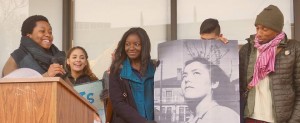 On January 20, the Providence Student Union (PSU) held a rally to demand the introduction of ethnic studies courses to all Providence public high schools by next fall.
On January 20, the Providence Student Union (PSU) held a rally to demand the introduction of ethnic studies courses to all Providence public high schools by next fall.
Students gave speeches about the need for a more inclusive and nuanced curriculum to a crowd of over 75 people outside the Providence School Department. “They make it seem like our countries are meaningless,” said Diane Gonzalez, a senior at Classical High School. She said students would be more excited for classes if they felt the material was relevant to them and their families.
The students also spoke about how the few mentions of people of color often happen in problematic ways.
“The oppression of enslaved African-Americans and Native Americans is disguised as this ‘cultural exchange,’” said Lee Caraballo during her speech. Another student, Latifat Odetunde, questioned why black history in the curriculum starts and ends with slavery.
While 91% of students in Providence public schools are students of color, fewer than 100 of their textbooks’ 1,192 pages are dedicated to people of color, making up less than 10% of the history curriculum, says Afaf Akid, a senior at E-Cubed Academy. As well, about 75% of Providence teachers are white, and Seena Chhan, a student from Central High School, spoke about wanting these courses to be taught by teachers of color.
The PSU’s campaign is not the first of its kind. Students around the US, in Oregon, California, Texas and Arizona, have made similar demands, to varying success. Gonzalez said she was inspired by the documentary Precious Knowledge about the fight for ethnic studies in Arizona. “They were not only learning about history; they were learning about oppression and about how to be leaders in their communities,” she said. “I deserve an education that makes me feel powerful.”
A recent study conducted by Stanford University looks at an ethnic studies pilot program with at-risk 9th graders and found that the course led to attendance improving by 21% and GPAs rising nearly a grade and a half.
The students put tons of work into organizing the event, such as coordinating with many different groups around the city, including Direct Action for Rights and Equality (DARE), the Providence Youth Student Movement (PrYSM), Youth in Action, the Environmental Justice League of RI and more, said Justin Silva, a student member of PSU. About a week prior to the rally, they also organized a petition aimed at the Providence School Board stating their demands, which has now been signed by close to 500 people.
Silva said that most people have been supportive so far. The crowd, largely made up of high school students of color, also consisted of teachers, administrators and other supporters. The Providence School Board superintendent, Chris Maher, attended and says he is in favor of ethnic studies classes.
More than anything, the students seemed excited, and determined, to learn new material. They carried brightly colored signs with slogans such as “My history is my identity” and “Without knowledge of history we are like a tree without roots.” They spoke about Zapatistas and Che, and in one speech, held up black and white photos of important resistance leaders — Bayard Rustin, Grace Lee Boggs, Ella Baker — and taught the crowd about them.
The rally ended with a chant: “Our History Matters.”
